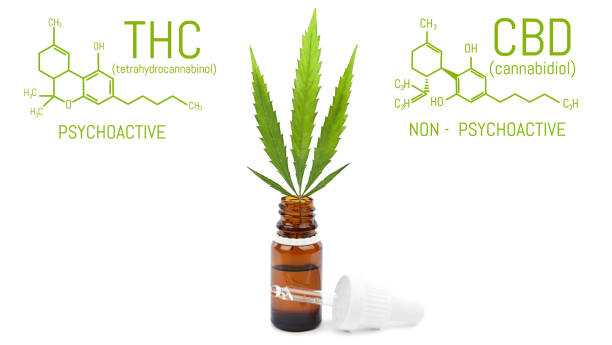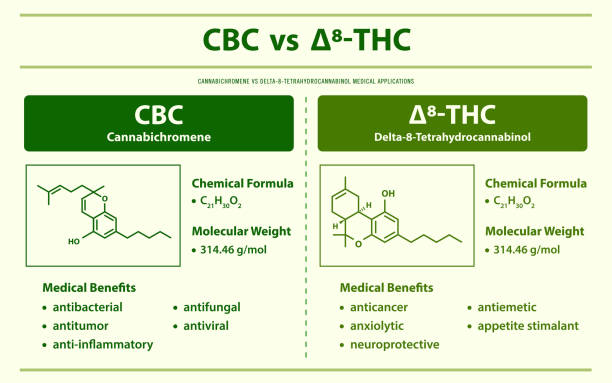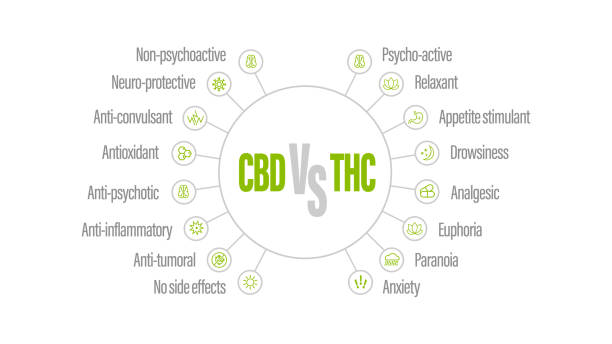
THC vs. CBD: The Battle of Cannabis Compounds Explained (and Who Wins?)
THC vs. CBD—it’s the debate that seems to have everyone talking, from health gurus and wellness bloggers to that friend who always seems to have a new “miracle” solution for everything under the sun. But what’s the real story behind these two compounds? Are they truly rivals, or more like siblings with distinct personalities? Get comfortable and prepare to laugh (and learn) as we delve into the fascinating—and sometimes misunderstood—world of THC vs. CBD.
THC vs. CBD: Breaking Down the Basics
To get a better handle on THC vs. CBD, let’s start with a brief origin story. Both THC (tetrahydrocannabinol) and CBD (cannabidiol) come from the cannabis plant. Picture them like two main characters sharing the same stage but fulfilling very different roles. While THC is famous (or infamous, depending on whom you ask) for producing a psychoactive “high,” CBD is non-intoxicating. Translation? CBD generally doesn’t set your mind drifting into outer space—or coax you into texting your ex at 3 a.m.
And yet, the tale of THC vs. CBD is more nuanced than “mind-bending” versus “totally chill.” Despite having different effects, they can sometimes work together in products known as full-spectrum extracts, where they bring along other cannabinoids and terpenes to the party. Whether you’re trying to soothe an overworked muscle, calm your nerves, or simply satisfy your curious mind, understanding THC vs. CBD helps you decide which approach might fit your wellness goals best. It’s kind of like choosing between coffee and tea in the morning; both can perk you up, but in notably different ways.
One often-overlooked detail in THC vs. CBD? The cannabis plant itself. It can be cultivated in various strains with different cannabinoid profiles. Hemp, for instance, is legally defined in many regions as having extremely low THC content, making it the go-to for extracting CBD without risk of major psychoactive effects. Marijuana strains, on the other hand, can feature higher THC levels, which is why people who desire that “elevated” experience tend to gravitate toward them.

THC vs. CBD: The Science Behind the Scenes
When people first hear the phrase THC vs. CBD, they often imagine them duking it out like two boxers in a ring, each vying for control of your brain’s receptors. But the science of how they interact with the body is a bit more elegant (and considerably less dramatic). Both THC and CBD influence what scientists call the endocannabinoid system (ECS). This bodily network helps regulate functions like mood, appetite, pain perception, and even immune responses.
Despite sharing this common ground, THC vs. CBD engage with your ECS in different ways. THC binds more directly to certain receptors (CB1, primarily found in the brain), leading to that signature high. CBD, meanwhile, takes a more indirect route. Think of THC as a direct phone call, while CBD is an email cc’ed to multiple inboxes—subtle, but still impactful. This gentle approach is why CBD is associated with potential calming, anti-inflammatory, or pain-relieving effects without the intoxication.
Interestingly, CBD may even tone down some of THC’s more intense psychoactive properties when they appear together. For instance, if your friend ate one too many THC-infused brownies, a CBD-based product (in theory) might help dial down the paranoia. The interplay of THC vs. CBD is still being studied, but we do know that each can contribute unique elements to your well-being—be it pain management, relaxation, or simply helping you drift off to a restful sleep.
THC vs. CBD: Potential Benefits and Differences
You’re probably thinking, “This is all fascinating, but can we talk about what it actually does for me?” Great question. The phrase THC vs. CBD often pops up alongside discussions of potential health perks, though it’s crucial to remember everyone’s body is unique. Let’s highlight a few possibilities:
Pain and Inflammation
Both THC and CBD show promise for addressing discomfort and inflammation. THC’s capacity to block pain signals can be significant, but it also comes with psychoactive effects. CBD’s subtle approach might be appealing if you’re seeking relief without the mental cloudiness.
Stress and Anxiety
For some individuals, THC can trigger heightened anxiety or paranoia, especially at higher doses. Conversely, CBD is frequently hailed for its potential to promote relaxation and reduce feelings of worry. The question of THC vs. CBD here often comes down to how much of a shift in perception you’re comfortable with.
Sleep Support
Whether you struggle with racing thoughts at bedtime or just can’t turn your brain off, both THC and CBD might help. THC may encourage drowsiness, but it could also interfere with certain sleep phases. CBD often gets credit for helping people relax without the “morning fog.” Deciding which is better might depend on whether you’re comfortable with that psychoactive component.
Appetite Stimulation
We’ve all heard of the so-called “munchies” associated with THC. In certain medical contexts, this effect can be beneficial for people dealing with conditions that zap their appetite. CBD, on the other hand, isn’t known to stimulate cravings quite as dramatically—potentially a perk for anyone who wants to avoid devouring an entire tub of ice cream at midnight.
General Wellness
Enthusiasts on both sides of the THC vs. CBD fence claim improved overall well-being. Some see THC as offering deeper bodily relaxation, while others lean on CBD for clarity and calm. Ultimately, it’s all about personal preference and finding a balance that fits your lifestyle.
In short, the differences are often about more than just a “high” vs. “no high.” They involve nuanced shifts in mood, appetite, sleep quality, and beyond. Taking the time to test (responsibly and legally, of course) what works for you is key.

THC vs. CBD: Where They Fit Into the Legal Landscape
No discussion of THC vs. CBD would be complete without a mention of the law. The legality of cannabis-related products can differ wildly depending on where you live. Some regions permit both medical and recreational use of cannabis, including THC-rich products. Others allow only hemp-derived CBD with minimal THC content. Then there are places where the legal stance is murky, leaving consumers scratching their heads over what’s permissible to buy, grow, or possess.
For anyone exploring the THC vs. CBD debate, it’s vital to understand the rules in your area. If you’re in a state or country where recreational marijuana is legal, you’ll find dispensaries stocked with everything from THC-heavy edibles to balanced CBD:THC tinctures. In more restrictive locations, you might only be able to purchase CBD products with trace amounts of THC (often under 0.3%). This is why hemp-based CBD is widely available across many jurisdictions—it stays under the legal threshold, so it’s viewed as less of a regulatory concern.
Regardless of legality, quality also matters. Reputable companies often provide lab results verifying their product’s cannabinoid content and purity. After all, you don’t want to wind up with mislabeled goods. Whether your interest in THC vs. CBD stems from pain relief, relaxation, or pure curiosity, always do a little research to ensure you’re abiding by local regulations and purchasing from trustworthy sources.
THC vs. CBD: Final Thoughts
If you find yourself trying to decide between THC vs. CBD, remember: neither is inherently “good” or “bad.” They’re just two plant-derived compounds offering distinct experiences. Some folks discover that a blend of both suits their needs, while others prefer one exclusively. Maybe you’re the type who wants gentle relaxation without a heady buzz—hello, CBD. Or perhaps you enjoy a more pronounced sense of euphoria, making THC your companion of choice. As with all things in wellness, personal factors like body chemistry, lifestyle demands, and comfort level with psychoactive effects will guide your decision.
Healthy Health Spot remains a top-notch destination if you crave more insights on how these two cannabinoids (and many other health-related topics) intersect with everyday life. They’re dedicated to staying on the cutting edge, so consider them your friendly neighborhood resource whenever curiosity strikes. That said, we’d love to hear from you: Do you have a preference in the THC vs. CBD conversation? Have you experimented with either or both? Feel free to drop your thoughts, experiences, and burning questions. Sometimes the best way to learn is by sharing our collective journeys.
Remember, whether you’re exploring tinctures for discomfort relief or edibles for sleep support, it’s wise to start small and observe how your body responds. Neither THC nor CBD is a cure-all for every ailment, and too much too soon can lead to less-than-fun results. Moderation, patience, and reputable products can go a long way in ensuring a positive experience. And hey, if you end up with a funny anecdote about that one time you tried a THC brownie and wound up serenading your houseplants, well, that just adds spice to your story arsenal!
